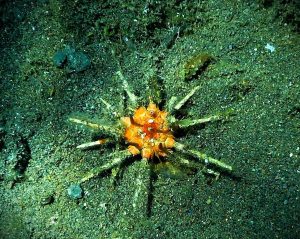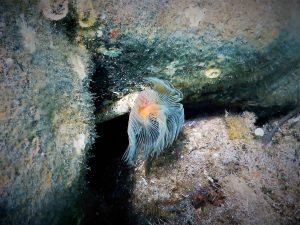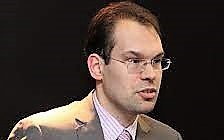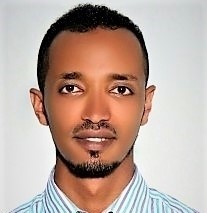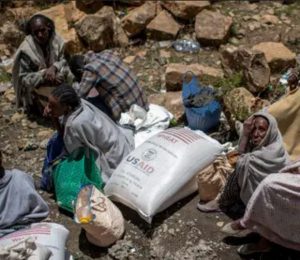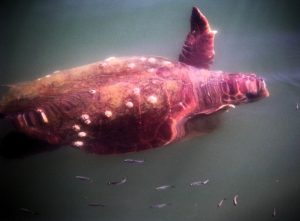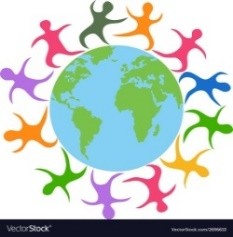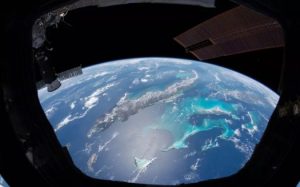IN A NUTSHELL
Editor's note
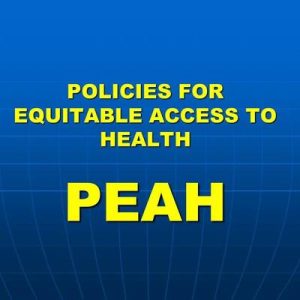 An accomplished professional with years of experience across global health, diplomacy, international relations, development, and humanitarian assistance, Dr Sebastian Kevany has conducted over 100 field missions to Africa, the Middle East, the South Pacific, Eastern Europe, and Asia with a focus on monitoring and evaluation, health security, human rights, biosecurity, health sector governance, research, and operational site visits.
Dr Kevany holds BA and MA degrees from Trinity College Dublin, an MPH degree from the University of Cape Town, is an adjunct assistant professor at Trinity College Dublin, an academic affiliate of the Center for AIDS Prevention Studies at the University of California, San Francisco, and specializes in short term international technical assistance.
Currently, He is publishing his third public health book, this time on the relationship between climate change and public health.
In this connection, PEAH had the pleasure to arrange an interview relevant to the thematic issues of his upcoming book filtered through his experience and critical lens
An accomplished professional with years of experience across global health, diplomacy, international relations, development, and humanitarian assistance, Dr Sebastian Kevany has conducted over 100 field missions to Africa, the Middle East, the South Pacific, Eastern Europe, and Asia with a focus on monitoring and evaluation, health security, human rights, biosecurity, health sector governance, research, and operational site visits.
Dr Kevany holds BA and MA degrees from Trinity College Dublin, an MPH degree from the University of Cape Town, is an adjunct assistant professor at Trinity College Dublin, an academic affiliate of the Center for AIDS Prevention Studies at the University of California, San Francisco, and specializes in short term international technical assistance.
Currently, He is publishing his third public health book, this time on the relationship between climate change and public health.
In this connection, PEAH had the pleasure to arrange an interview relevant to the thematic issues of his upcoming book filtered through his experience and critical lens
By Daniele Dionisio
PEAH – Policies for Equitable Access to Health
INTERVIEW
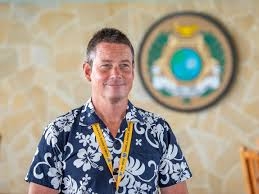
Sebastian Kevany
Global Health Security and Diplomacy
United Nations University
–PEAH: Dr Kevany, can you detail about the main themes of your near to be finalized book tentatively entitled CLIMATE CHANGE, PUBLIC HEALTH, AND REGIONAL SECURITY IN THE INDOPACIFIC: FROM MITIGATION TO ADAPTATION?
–Kevany: Daniele, thank you. So your first question, detail about the main themes of the book.
You know, it’s unquestionably, these days, a controversial subject. So I try to stay away from the controversial side, Daniele, and, think about specifically the links between the environment, as in climate, weather events, natural disasters, whatever you wanna call it, even political, environment, economic, but mainly environmental in terms of the natural environment, and its connection with human health, not just public health, but day to day individual level human health. It could be obesity. It could be mental health. Could be infectious disease, any of the above.
And, the Indo Pacific region is, of course, where all the action is, I guess you could say, in this regard.
–PEAH: The book results from a number of chapters and a group of contributors. What as regards its scope and aims?
–Kevany: As regards the scope and aims of the book, it is intended to generate inputs from not necessarily experts, but day to day, normal people living in the region, Hawaii, Philippines, even as far away as Pakistan, India, and to try and get an understanding for their experiences personally and professionally. Many of these people will have come from environmental or public health backgrounds. So just sharing their stories. Could be a nurse from The Philippines or a military officer from Sri Lanka. What is this connection that they have experienced, and what do they look, what do they expect to see in the future regarding the connection between climate change, public health, and, regional security.
–PEAH: Is there still room to include in the book additional contributions, either personal or professional, while enhancing its impact through as many views and experiences as possible?
–Kevany: Regarding additional contributions, absolutely. There is room to include, at this stage, both personal and professional reflections, essays, or other inputs, and as you rightly say, enhancing its impact to as many views and experiences as possible.
–PEAH: Let us know, please, about your global health and humanitarian background as part of your engagement with international agencies and organizations.
–Kevany: My background, Daniele, yes, I guess it’s been a very engaging, adventurous, just amazing journey for me regarding efforts in global health, public health, I guess you could say humanitarian development.
And it’s involved WHO-World Health Organization, various United Nations organizations, the Global Fund to Fight AIDS, TB, Malaria, bilateral initiatives and NGOs, of course.
So it’s been, I’ve been so lucky, you know, to have done that work at a stage in history when it was a very dynamic field.
And I got to see a lot of the world, I feel that the efforts made an impact, not just a charitable impact, but in terms of international relations and international security as well.
–PEAH: Dr Kevany, what’s your position as regards sentences below by All Life Institute (as “a global think tank uniquely dedicated to protecting and enhancing all life on this planet including humans, nonhumans and the Earth.”)?
- “All that we do depends upon abundant plant and animal life as well as clean air and water.”
- “Our collective future depends upon the decisions that we are making now.”
– Kevany: In regards to the statements by the All Life Institute, you know, and thank you for the description of the Institute. It reminds me of the One Health approach, of course, when you quote ‘’All that we do depends upon abundant plant and animal life, as well as clean air and water’’. For me personally, and based on my professional experience, it’s true.
It is a true statement. Without clean air, without clean water, the effects on human health are just one part of the consequences, because you have to deal as well with effects on the environment, all of these, I guess, indirect effects on human health. You know, not just the natural environment and the health and aesthetics of that realm, but also in terms of agriculture, in terms of social functioning, in terms of economics, which then leads into politics and national stability.
And in the same way, yeah, of course, our collective future does depend on the decisions that we are making now. But for both quotes, what I would suggest is this is not obvious and it’s hard to prove. And in theory, it is logical.
But we’re just getting into a stage, I think, when we’re becoming more aware of the finite nature of the Earth’s resources in the context of human population. It’s not something that was very much in our consciousness a generation ago. It wasn’t part of economic theory, which promoted growth and gross domestic product and those kind of indicators as the number one measures of success, I guess you could say, personally or nationally.
And it was before the themes of resilience started to emerge. Now, successful countries, successful communities, even successful individuals are less and less measured in terms of their worth and value and what you might call success by economic productivity, because you can be economically productive, but also destroy the environment. So it’s short term economic productivity.
And now that we’re putting a price, a value on the environment and not just seeing it as infinite, you know, as we see species become extinct, as we see natural areas become more limited, as we become more aware of the Earth as, I guess, an organism, you know, and as we move more towards one world, one people. It’s this breakthrough that came, I think, with looking at the Earth from space and seeing it for the first time as something beautiful, but also fragile and potentially vulnerable.
–PEAH: This links in with re-orienting practises and behaviours by governments, corporations and civil society towards reversing climate deterioration. What would you recommend?
– Kevany: In terms of practises and behaviours by governments, corporations and civil society towards reversing climate deterioration, it’s a complex issue. It sounds so simple. It sounds as if we should simply say this is what needs to be done in order to preserve the natural environment and these should be the policies.
What I’ve experienced, one thing I’ve experienced more than anything else is exposure to extreme poverty in the world and that’s, you know, up to perhaps some might say 90% of the world’s population. And what I have noticed, Daniele, in those environments is no one is going to spend more money for environmental protection. No one is going to switch to unleaded fuel if it’s more expensive. No one is going to stop using plastic bags if it’s essential to their survival. No one is going to spend more on the environment if it costs them the price of an extra loaf of bread, so to speak. So, in a way, these are the people.
These are the behaviours that are going to determine the success of any such policies. And so the policies themselves will not be effective, I think, until global poverty and inequality has been addressed. And, of course, that is not an easy thing to do.
Maybe that is an impossible thing to do.
– PEAH: In this connection, do you agree with statement whereby “What is good for nonhumans and the Earth is virtually always in the best interests of humans, given the profound interdependence of all life.”?
– Kevany: Regarding this statement, ‘’What is good for non-humans, and the earth is virtually always in the best interest of humans, given the profound interdependence of all life’’, you know, I came across a quote from Marcus Aurelius, your countryman, Daniele, and it was put very simply, what is bad for the beehive is bad for the bees. Unquestionably, what is good for the earth is good for humans.
–PEAH: Aiming to fill the health and development gaps you are dealing with, which partners do you currently count on?
–Kevany: In regards to the health and development gaps, what I would suggest, Daniele, is that there’s possibly a transition happening. The world has changed so much. When my dad was a public health professional, say, in the 1960s working for Pan-American Health Organization, and in those days, it was so clear that there was the developed world and the developing world, and the developed world did its best to help poor countries, what was called the Third World, to control irradicable or to control diseases that cures were available for. It was that simple. And that happened. And since then, it’s gotten more complex, you know HIV, TB, malaria, no easy way out. And the dynamic has also changed between the developed and the developing world.
I don’t think that distinction is there anymore. There are incredibly impoverished, poor, miserable places in rich countries. And there’s a lot of prosperity, even though it can be isolated in what was formerly known as the developing world. Everything has become a little bit blurred here in the 21st century. So what I would suggest, especially given the current funding environment, is that I don’t think counting on partners is the way forward. I think anyone can be a partner, and anyone can be a reliable partner. But the movement, I guess, is away from dependence on funding and more towards technical assistance. So bring in an expert, bring in a consultant, bring in someone who knows about health systems, and let them visit the clinics, let them visit the Ministry of Health, and let them talk to the administrators and offer, if asked, their suggestions on how things might be done differently, or modernized without reliance on investment, just using the skills that are there, using the infrastructures there, that is there using the traditional systems. And that is not going to cost people a huge amount. It’s not going to be reliant on funding. You’re not going to have to count on partners. It’s going to be internally reliant. And I think that’s maybe the best strategy for now.
–PEAH: Thank you Dr. Kevany for the excellent work joining diplomacy and humanitarian commitment.
– Kevany: Thank you as well, Daniele. Thank you for your recognition of the need to connect international relations, security, diplomacy, humanitarianism, development, and health.
